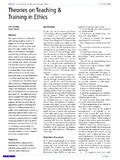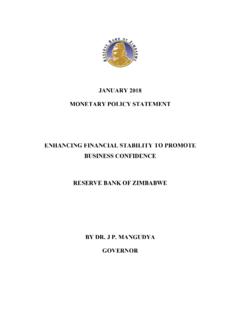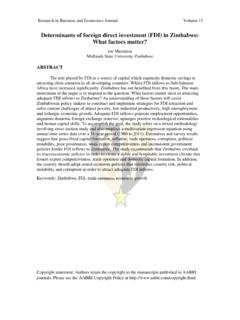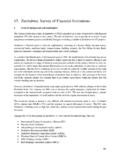Transcription of EJBO Whistleblowing in the Context of Zimbabwe’s Economic ...
1 EJBO Electronic Journal of business Ethics and Organization StudiesVol. 12, No. 2 (2007)32 in the Context of zimbabwe s Economic CrisisDennis MasakaAbstractWhistle blowing is a topic that has taken center stage in philosophical discussions on business ethics in recent years. It continues to provoke debate among academics because of its continued relevance to the present prevailing situations the world over. The recent upsurge in cases of corporate wrongdoings in zimbabwe has seriously reactivated a concerted debate on the moral justification of whistle blowing. The whistle blower is, however, faced with competing and conflicting moral values and imperatives that make his decision to blow the whis-tle a morally excruciating endeavour. It is the contention of this article that, despite employees obligations of loyalty and obedience to their employers, whistle blowing can still be morally justified on the grounds that it aims at righting wrongs that have a potential to pose harm to the public.
2 In view of this, therefore, the paper argues that whistle blowing ought to be encouraged rather than discouraged in the Context of Zimba-bwe s Economic , business , Moral, zimbabwe , Economy, CrisisIntroductionWhistle blowing is a practice that has dominated contemporary philosophi-cal discussions for decades. It continues to provoke debate among academics be-cause of its controversial nature. It is con-troversial because the whistle blower has to content with personal, company and societal obligations. These obligations conflict. As a result, the whistle blower is confronted with conflicting values both personal and moral that make his deci-sion to blow the whistle an excruciating undertaking. Conflicting moral values lead to moral dilemmas. This article ex-plores the moral dilemmas faced by whis-tle blowers in an attempt to proffer moral grounds for whistle blowing in the con-text of zimbabwe s Economic challenges.
3 The term whistle blowing is going to be used in this article to refer to unau-thorized exposure of immoral business practices at one s work place to authori-ties outside the organization and the public which the whistle blower is con-vinced to be a threat to public good and health. Such courageous undertaking to unearth incidents of corporate wrongdo-ings is necessary given the recent upsurge in cases of perceived unethical business practices in zimbabwe . These unethical business activities include overpricing, sale of substandard commodities at exor-bitant prices and sale of commodities that are injurious to the health and well being of the public because of, among others, their low quality and structural short-comings. In view of the rampant increase in cases of immoral business practices in zimbabwe , this article strongly argue for the moral justification of whistle blowing as a morally legitimate way of righting business wrongs.
4 However, a significant promotion of whistle blowing in Zim-babwe can only be achieved if both the business sector and government jointly commit themselves to encourage it if it is primarily predicated on desire to fur-ther public welfare and well being. Such a commitment can be complimented by putting in place legal instruments that aim at the protection of whistle blowers in case of lawsuits, harassments, job loss and unjustified demotions. We, therefore, recommend that legal instruments be put in place in zimbabwe in order to protect whistle blowers from reprisals and frus-trations, and also to secure compensation for those who suffer victimization for re-vealing serious business wrong doings at their work possibility of Ethics in BusinessA worthwhile exposition of whistle blow-ing can only be undertaken in the Context of proper understanding of the business -ethics dichotomy.
5 Ethics studies moral obligations involving the distinction be-tween right and wrong. business ethics is a culmination of attempts to extend moral dimensions to business practices (Morscher etal, 1998:145). In this light, business operations have to be grounded upon a moral foundation if its practices are to be reliable and predictable. Hence, business ethics aims at promoting ethical conduct in business asserts the importance of ethics in humanity s daily endeavours and interactions with business and otherwise. For him, an unethical person is very diffi-cult to conduct business with in that one cannot risk trusting him and the commit-ments and promises he makes (Treviino and Nelson, 1995:290). business is only possible if the ones who engage in it do so in a manner that shows respect for the well being of partners, clients and the so-ciety at large. A case in point is that of zimbabwe where business malpractices are reported to be on a meteoric rise.
6 People have lost faith in business in gen-eral given a plethora of cases of business misconducts that have beset zimbabwe s economy such as hoarding of basic com-modities, profiteering, overstating the virtues of products being sold and other forms of business cheating such as selling of substandard commodities. It is in view of the above, therefore, that we argue for ethics to be at the very center of business dealings in zimbabwe . In the same vein, Vin Sarni believes that our lives should be grounded and led by a code of ethics. He rejects law as the sole and wholly suf-ficient standard, which guides and deter-mines human conduct (ibid: 291). For him and others, ethics transcend the legal code in that ethics requires human beings to behave not only lawfully, but also in an EJBO Electronic Journal of business Ethics and Organization StudiesVol. 12, No. 2 (2007)33 acceptable manner.
7 Thus, in some sense, ethics and law complement each other in order to bring about a society that abides by and respect moral and legal of business ethics, have, however, argued that business and ethics have no common ground. The basis of their argu-ment is that since the primary aim of business is to maximize profits, concern for morality in this endeavour is non-existent. Albert Z. Carr, for, instance, contends that business has its own moral standards peculiar to it (Shaw, 1999:15). In view of this, business practices ought to be evaluated only by those stand-ards. He, therefore, rejects the attempts to legislate additional rules in the form of moral rules whose purpose is to ensure morally acceptable business practices. In this light, business is viewed as amoral meaning that ethics has nothing to do with business activities. Thus, the proponents of this view regard talk of ethics in business as a contradiction in terms.
8 For Velasquez (2002:2):Pundits sometimes quip that business ethics is a contradiction in terms because there is an inherent conflict between ethics and the self-interested pursuit of profit. When ethics conflicts with profits, they imply, business always choose profits over , there are other business organizations that pursue business practices that take into account public interest than outright obsession with the profit motive because doing so has long-term effects on the success of the business . The argument advanced by those who reject the possibility of ethics in busi-ness, therefore, seems to be flawed. The business world con-stantly interacts with societies that cherish ethical values. In this light, therefore, it would be absurd to argue that ethics and busi-ness do not mix. Man s life is shaped and regulated by ethical codes that are cherished by society and in the long run impact on his decision-making.
9 Such an interaction between business organizations and human society ought to drive the society to insist upon business organizations to conduct their affairs in an ethically responsible and transparent manner and to take into account both the requirements of the public and their interests. However, this does not mean that occasions never arise when doing what is ethical will prove costly to a does it mean that ethical behavior is always rewarded or that unethi-cal behavior is always punished (Velasquez, 2002:5). For Ve-lasquez, wicked business practices are sometimes beneficial to business owners than morally upright business conduct. How-ever, it must be noted that commendable business practices are crucial for the long-term prospects and success of business and can ultimately give such an organization a competitive edge over those organizations whose ethical conduct are bad. It is, therefore, our submission that failure to conduct busi-ness in an ethically responsible manner will lead to a lot of ani-mosity and mistrust between business and society.
10 Such an un-fortunate scenario is detrimental to both society and business . Thus, Shaw (1999: 5) rightly criticizes those who advance the contention that there is no ethics in business for grossly misrep-resenting reality. Therefore, the argument posed by the propo-nents of amoral business seems unrealistic for the reason that even though the Economic goal of business is to maximize prof-it, business ought to be grounded upon a moral foundation if its promises and pronouncements are to be reliable and predict-able. Even though it is a common conviction of many that the unavoidable measure of business success is the maximization of profits, such aims ought to be subordinated to the pursuits of genuine human goods, that is, health and welfare. Hence, it is the conviction of this article that business cannot be alienated from the society, which it provides with goods and services to satisfy their needs and wants.









